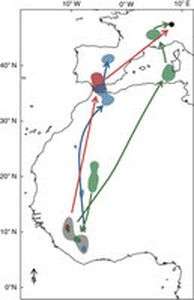October 9, 2013 report
Study shows alpine swift can stay aloft for 200 days

(Phys.org) —A combined team of researchers from Bern University and the Swiss Ornithological Institute has found that alpine swifts are able to fly for up to 200 days at a time, without landing. The team learned of the bird's unique abilities to fly for such long stretches by attaching tiny sensors to several migrating specimens. They have published the results of their findings in the journal Nature Communications.
No one has ever doubted that alpine swifts spend most of their lives aloft—some have even suggested they spend their whole lives flying. But until now, no one has proven just how long they are able to fly without stopping.
To find out, the researchers attached very tiny sensors to six of the birds—the sensors measured light and acceleration. Though only three of the sensors were recovered when the birds returned, there was enough data to allow researchers to retrace the routes the birds took, to determine when they were in different parts of the world, and whether they were flapping their wings or gliding. The birds in the study were captured in Switzerland and then released. Alpine swifts migrate to Africa and back every year.
In analyzing the data captured by the sensors, the researchers found that the test birds stayed in the air at one point for 200 days, covering approximately 10,000 kilometers in the process. This, the researchers report, is the longest flight duration ever recorded by a bird, and is only equaled by some sea-going creatures who need only propel themselves forward—birds of course also have to keep themselves in the air, a process that consumes a lot of energy.
Some of the most obvious questions that come to mind regarding the birds are: how do they eat and drink? When do they sleep? Prior research has an answer for the first, they eat what is known collectively as aerial plankton—a mix of fungus spores, small insects, seeds and even bacteria that float about in the sky. The water in their food is apparently enough to sustain the birds indefinitely. As for how and when they sleep, scientists are still divided. Data from the sensors in the study indicated slow-downs, or periods of reduced activity where the birds glided more than flapped, but that clearly isn't enough evidence to prove that the birds were sleeping. Some suggest that the birds, like some other organisms, don't have to sleep, or only do so during certain periods of their lifecycle, such as during mating season.
More information: First evidence of a 200-day non-stop flight in a bird, Nature Communications 4, Article number: 2554, DOI: 10.1038/ncomms3554
Abstract
Being airborne is considered to be energetically more costly as compared with being on the ground or in water. Birds migrating or foraging while airborne are thought to spend some time resting on the ground or water to recover from these energetically demanding activities. However, for several decades ornithologists have claimed that some swifts may stay airborne for almost their whole lifetime. Here we present the first unequivocal evidence that an individual bird of the Alpine swift (Tachymarptis melba) can stay airborne for migration, foraging and roosting over a period of more than 6 months. To date, such long-lasting locomotive activities had been reported only for animals living in the sea. Even for an aerodynamically optimized bird, like the Alpine swift, flying requires a considerable amount of energy for continuous locomotive control. Our data imply that all vital physiological processes, including sleep, can be perpetuated during flight.
Journal information: Nature Communications
© 2013 Phys.org




















